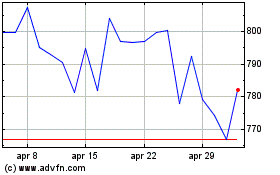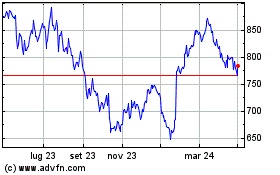By Matthew Dalton
Italy's coronavirus lockdown has the global luxury-goods
industry straining to keep factories open in the country while
adopting precautionary measures to fight the spread of the disease
in its ranks.
The makers of luxury goods -- from industry giants like LVMH
Moët Hennessy Louis Vuitton SE and Prada SpA to smaller ateliers
with global markets -- are providing workers with protective gear,
closing workplace cafeterias and warning employees to keep their
distance from each other. The Italian government order, issued
Monday night, has barred travel and public gatherings across the
nation, but it contains an exception to allow business activity to
continue.
While the initial outbreak in China took a big bite out of
demand for luxury products, the disease's spread to Italy is now
testing its ability to make many of those items. The luxury
business is one of the few industries in recent years that has
boosted its production in Italy, drawing on the country's mystique
and heritage as a key selling point with shoppers from New York to
Beijing.
Telling staff to simply work from home or avoid physical contact
is difficult in an industry whose beating heart is the workshop
where dozens of artisans collaborate, often in close quarters.
Shutting that production would be a huge blow to the Italian
economy. Luxury goods companies employ tens of thousands of people
and are among the country's biggest exporters.
"On the production side, remote working is not possible, so it's
a question of managing risk by reducing contact between people,"
says Matteo Lunelli, chairman of Altagamma, which represents
Italy's luxury industry. "It should be possible to find a solution
to protect the flow of goods and at the same time the health of the
people."
Big firms like Franco-Italian EssilorLuxottica SA, which makes
eyeglasses for luxury brands like Persol and Bulgari, as well as
Oakley and Ray-Ban, continue to operate their factories in Italy.
Louis Vuitton, owned by LVMH, has kept open its global shoe factory
in the Venice region, site of one of Italy's biggest disease
clusters.
But others worry the government might need to impose a hard
lockdown, with no exceptions for business. That helped China tamp
down the outbreak in Wuhan province, where the coronavirus first
emerged and swept across the globe.
"I fear we may be underestimating what needs to be done to
contain the problem," says Luca Solca, luxury goods analyst at
Bernstein. "The risk is that the government may have to implement
more draconian measures, in a similar manner to what the Chinese
did in Wuhan."
Pelletteria Graziella, a leather-goods supplier near Venice, has
taken a host of steps to keep the virus out of its factory as it
continues production. The threat has been at its doorstep for
several weeks, since a cluster of cases emerged in the region.
Now, the workshop's 50 artisans wear masks while they work. Last
week, the factory installed air filters. Each worker's temperature
is taken at the start of the day. Truck drivers making deliveries
to the facility aren't allowed to get out of their vehicles.
"It's a little sad to see, but you can understand that it's a
difficult situation," says Davide Zampieri, development and
production coordinator for the company, which supplies a host of
luxury brands such as Bottega Veneta and Dries Van Noten.
The company is also considering closing the factory for at least
a week and relying on a network of external workers. For more than
a century, the region, known as Riviera del Brenta, has specialized
in making shoes and leather goods, fostering a network of artisans
that have small workshops in their houses. They often worked by day
in factories and then in the evening from home.
"This is our Plan B," Mr. Zampieri said.
The company is under pressure to fill orders made before the
coronavirus outbreak spread in Italy. The next round of orders,
however, is likely to show a major decline, as luxury shoppers
world-wide have cut their spending during the epidemic.
"We are waiting right now to receive the orders, but the
feedback is very negative," he says. "For sure, a decrease of
40%."
On the other side of Italy near Florence, leather goods
suppliers are still producing as usual. The region, centered on the
Florentine suburb of Scandicci, has been spared a major disease
outbreak compared with the areas around Milan and Venice to the
north.
"The situation [we see elsewhere] on TV is worse than in
Scandicci," says Massimiliano Guerrini, whose family owns Almax,
which produces handbags for Balenciaga, Fendi and other global
fashion brands.
So far, his clients haven't notified him of any canceled orders.
The company is advising its workers on proper hygiene and decided
this week to close the company cafeteria, to keep large numbers of
people from gathering in one place.
Almax runs a factory with 200 artisans, and doesn't have the
option of relying on outside workers like Pelletteria Graziella,
the leather-goods maker near Venice.
"It's impossible," Mr. Guerrini says. "We are too big."
Write to Matthew Dalton at Matthew.Dalton@wsj.com
(END) Dow Jones Newswires
March 11, 2020 05:41 ET (09:41 GMT)
Copyright (c) 2020 Dow Jones & Company, Inc.
Grafico Azioni Lvmh Moet Hennessy Louis... (EU:MC)
Storico
Da Mar 2024 a Apr 2024

Grafico Azioni Lvmh Moet Hennessy Louis... (EU:MC)
Storico
Da Apr 2023 a Apr 2024
